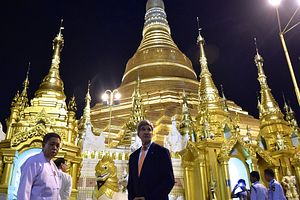China is once again accusing the U.S. pivot of causing the recent tensions in the South China Sea.
In the wake of the U.S. and China squaring off over the South China Sea at the ASEAN Regional Forum, Xinhua published a blistering critique of U.S. policy towards the waters.
“By stoking the flames,” Xinhua opined, “Washington is further emboldening countries like the Philippines and Vietnam to take a hardline stance against China, raising suspicion over the real intention of the United States and mak[ing] an amicable solution more difficult to reach.”
The editorial continued: “It can hardly be accepted as a coincidence that the previously calm South China Sea has lost its tranquility since the United States embarked on its pivot to Asia strategy.”
This is not uncommon; China regularly accuses the U.S. pivot of stoking tensions in the South China Sea. In particular, Beijing claims that the U.S. pivot has emboldened allies and partners like the Philippines and Vietnam to take a hardline stance against China, which has perpetuated the various disputes in the South China Sea.
This is patently false. To begin with, even if the U.S. pivot did embolden U.S. allies and partners (and I don’t believe this is the case), it is still China that is acting in an offensive manner in the disputed waters. For example, China took the offensive in placing an oil rig in disputed waters with Vietnam, and trying to block the same resupplies the Philippines has been bringing to the Second Thomas Shoal for decades. Similarly, it is China that has stepped up patrols of disputed areas of the South China Sea, such as the Scarborough Shoal, and it is also Beijing that is building various fixtures on disputed islands it administers.
Even if U.S. allies and partners would have quietly acquiesced to these moves had the U.S. never announced the pivot, it is China that has initiated the tensions. U.S. allies and partners have been acting in a reactionary manner to China’s offensive maneuvers. Thus, China is primarily to blame for the tensions in the South China Sea. If anything, the U.S. pivot may have just complicated China’s ability to secure its offensive objectives in the South China Sea by encouraging Southeast Asian states to stand up to Beijing’s aggression.
But it’s not at all clear that even this is the case. Indeed, if countries like the Philippines and Vietnam have been actling boldly towards China, one wonders what actions would be considered passive? The Philippines, for instance, simply ceded the Scarborough Shoal to China without a fight. When China began blockading its resupply ships to the Second Thomas Shoal, the Philippines merely tried to find creative ways to get around the blockade without initiating a standoff with Chinese vessels. It never even sought to end China’s blockade of islands it’s administered for at least 15 years.
Vietnam put up slightly more resistance to China’s placing of an oil rig in disputed waters, but this just reflects the fact that Vietnam is stronger than the Philippines and its sense of nationalism is highly intertwined with resisting Chinese encroachment. In any case, even as it tried to disrupt the oil rig’s operations, it simultaneously tried to pursue diplomacy with China every step of the way. It was Beijing that refused to seriously engage Vietnam on the issue since it doesn’t recognize the waters are even disputed.
It’s hard to imagine Vietnam or the Philippines putting up less resistance to China’s aggression were the U.S. pivot never announced. After all, countries are not in the business of donating their territory to their more powerful neighbors. In any case, even if Vietnam or the Philippines would have given up their territory without a fight if the U.S. had never announced a rebalance, this hardly leaves China faultless for the current tensions.
Indeed, Imperial Japanese forces claimed the Nanking Massacre was in retaliation for the fierce resistance they encountered from the Nationalist forces between Shanghai and Nanking. Does that mean that China is actually to blame for Japan’s atrocities because if it hadn’t resisted then the Japanese troops wouldn’t have been thirsty for revenge and willing to extract it from innocent women and children? As the Naval Diplomat would say, me thinks not.

































